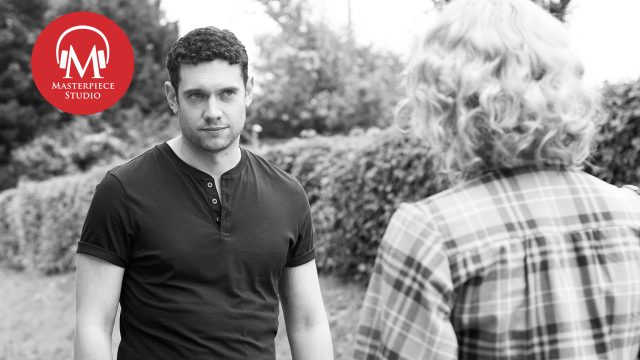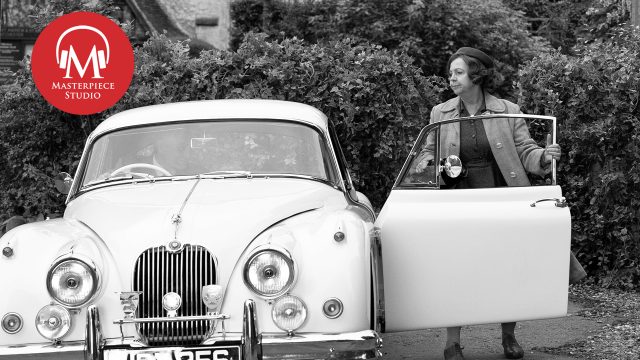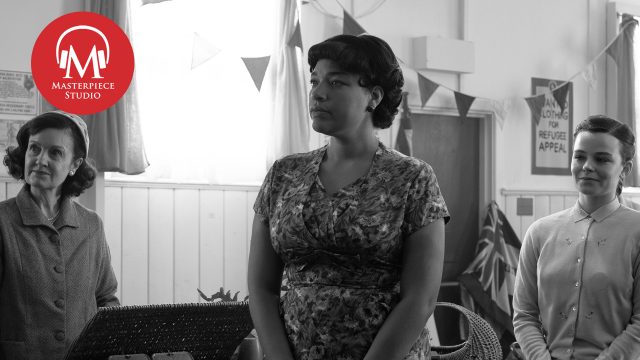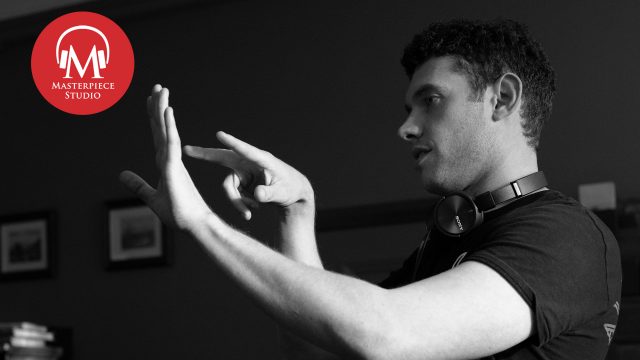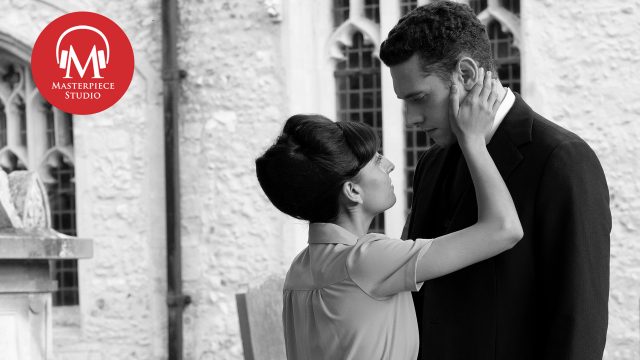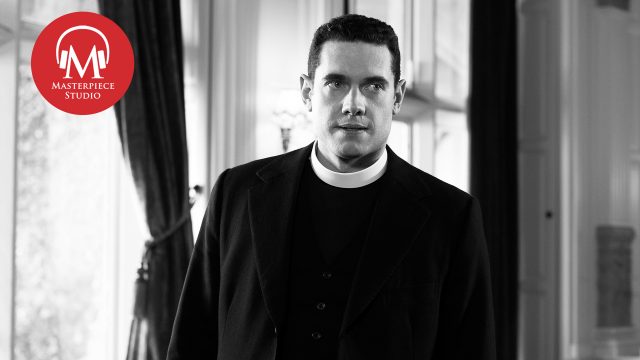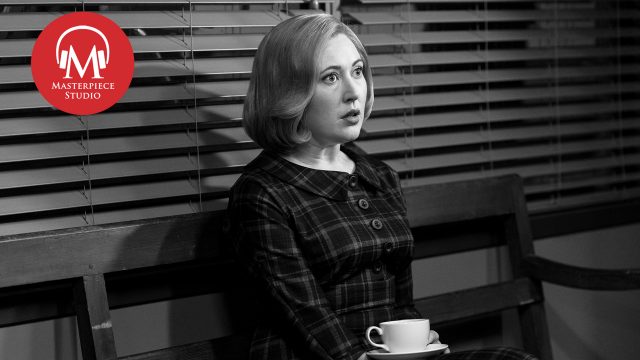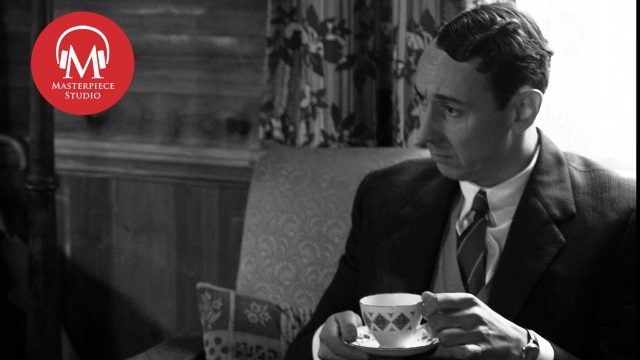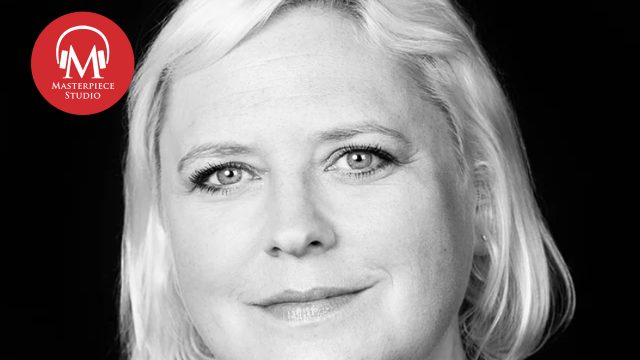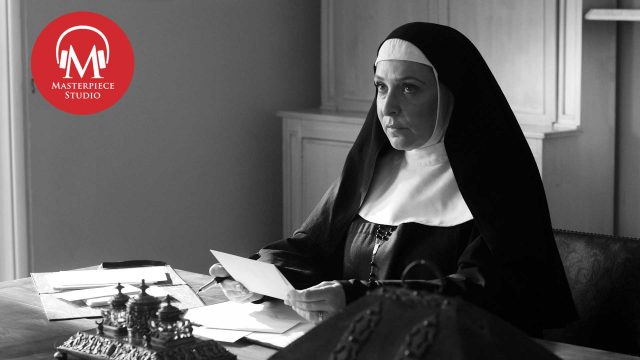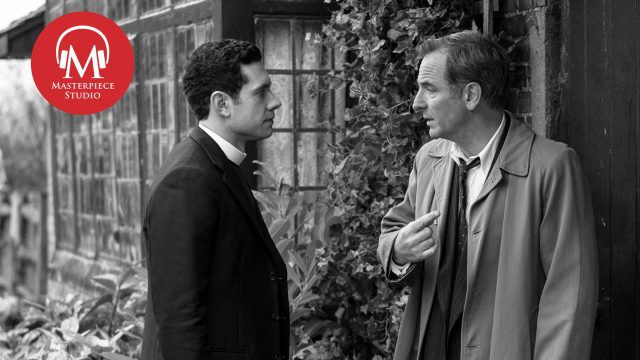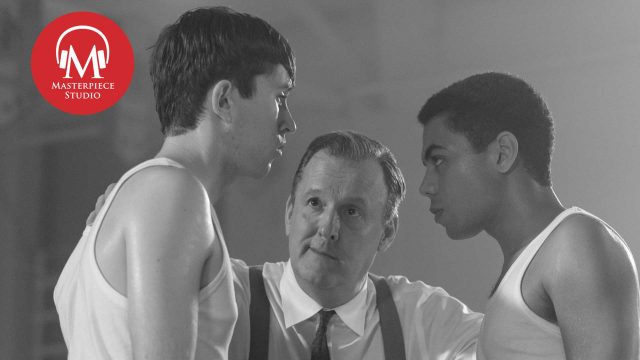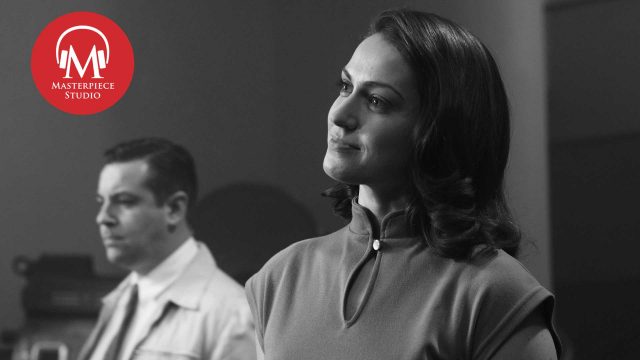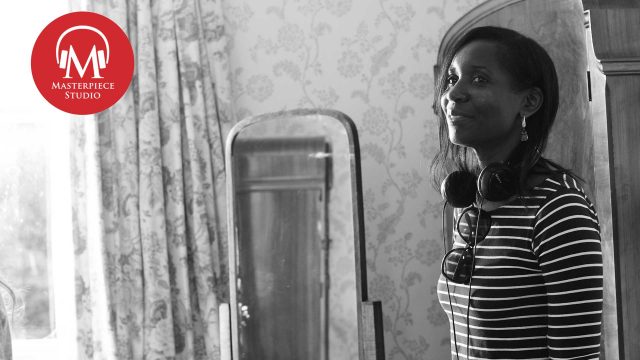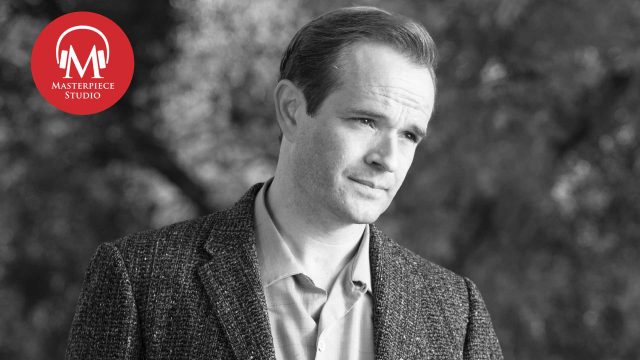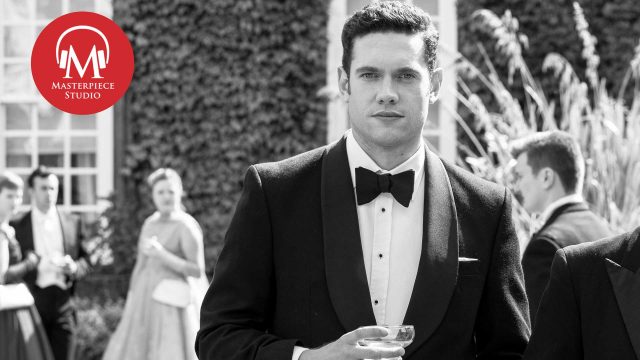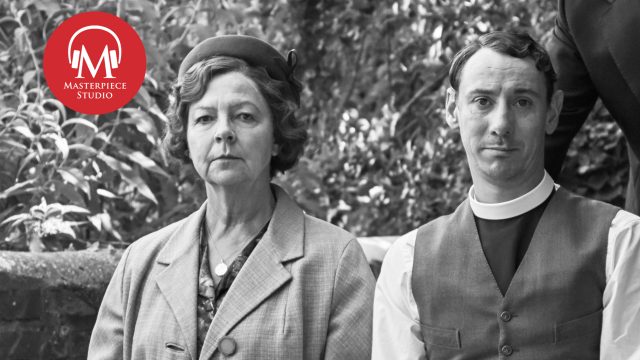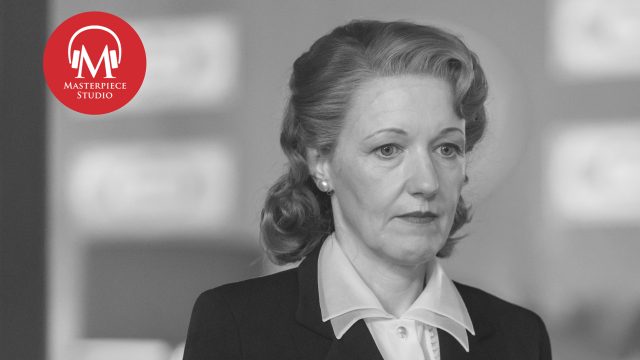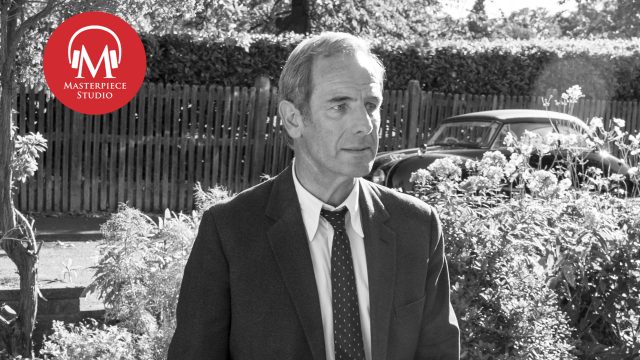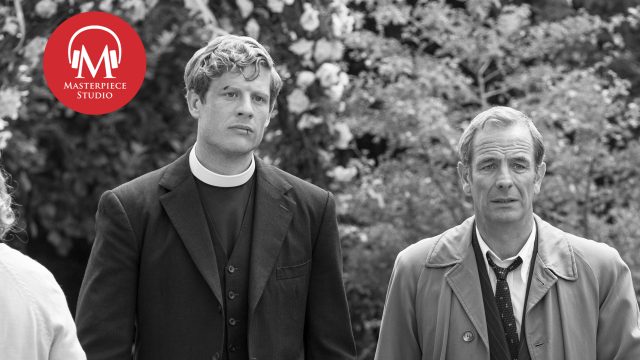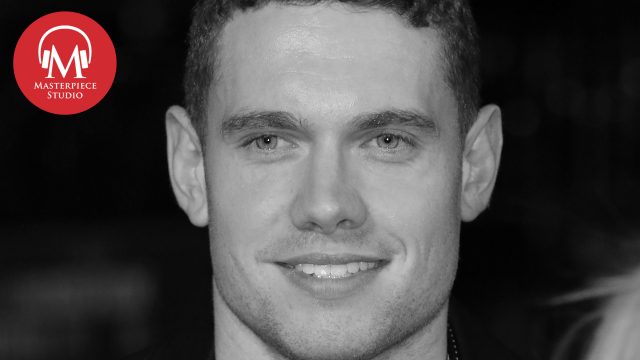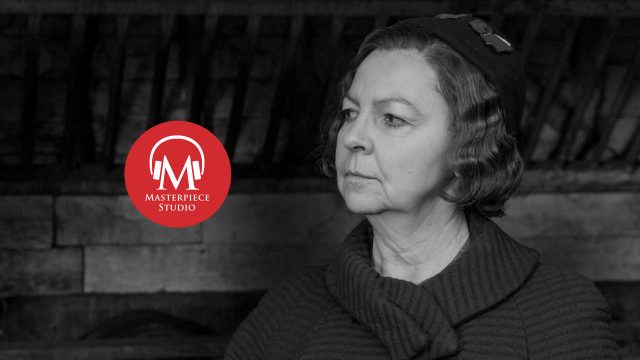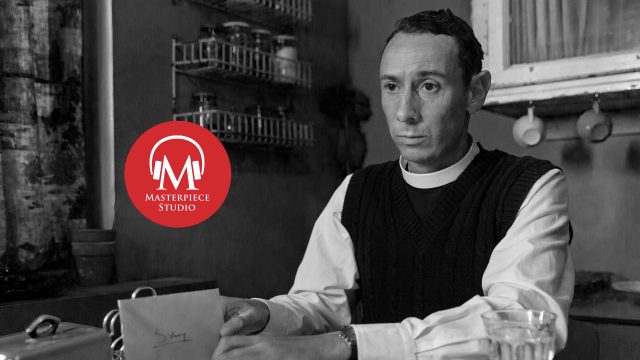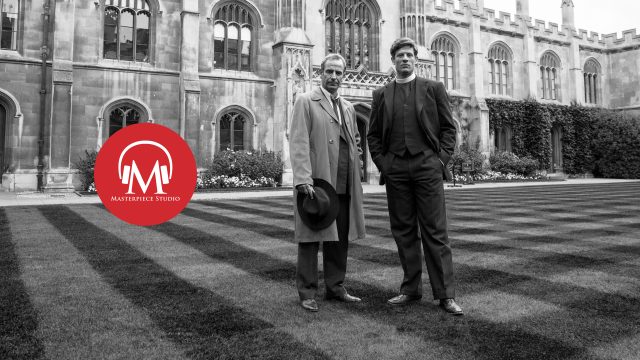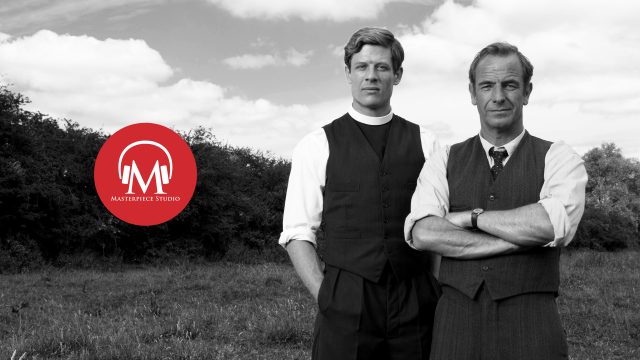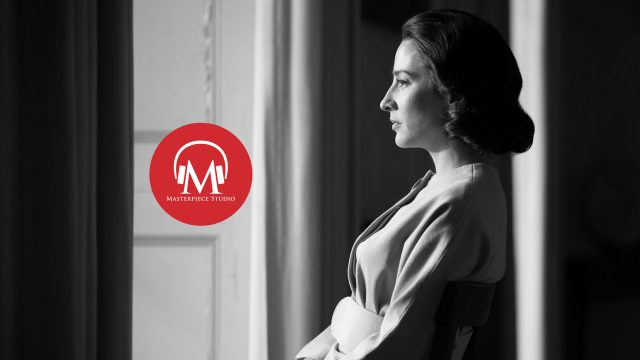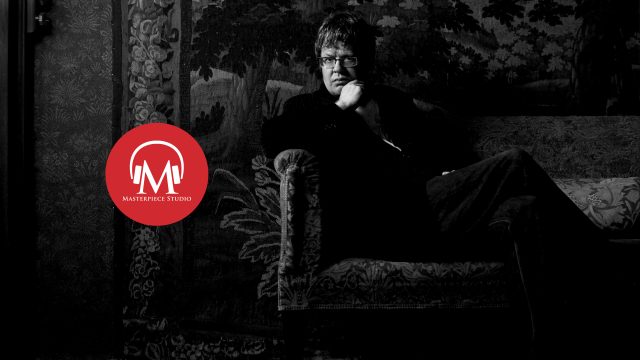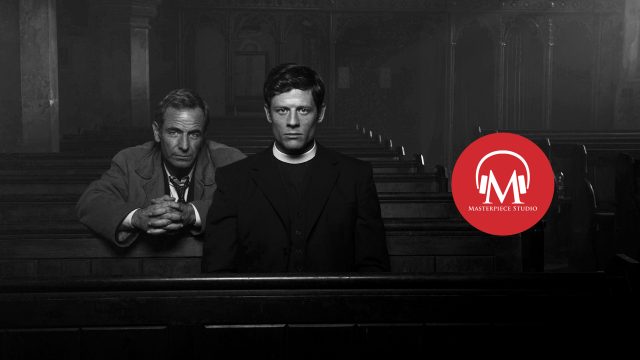The heavy burden of replacing Grantchester lead James Norton in the village vicar’s pulpit falls to none other than Tom Brittney, and it’s a role he’s thrilled to take up. With a warm welcome from fans and the on-set Grantchester family alike, Brittney reveals how it felt to motorcycle in to the sleepy village, and previews what secrets await viewers for the rest of this season.
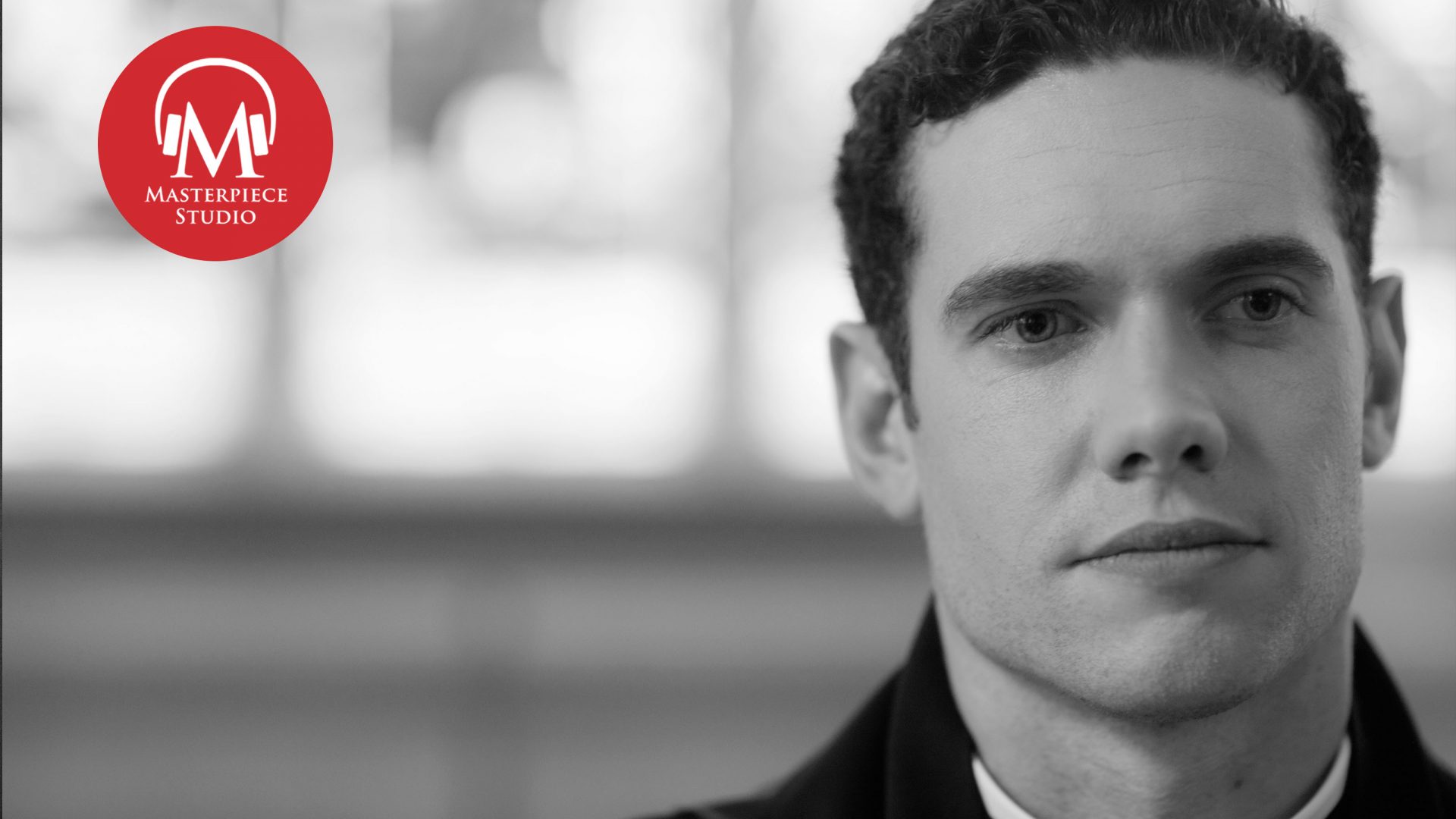

Tom Brittney Is More Than Just Another Dashing Vicar
Released 40:17
Related to: Grantchester, Season 4
Download and subscribe on: iTunes | Spotify| RadioPublic
Transcript
Jace Lacob: I’m Jace Lacob, and you’re listening to MASTERPIECE Studio.
Good news! There’s a new vicar in the sleepy, bucolic hamlet of Grantchester, and it’s…not Leonard Finch?!
CLIP
Leonard: Will’s bidding farewell to the city center. He’s going to be the new vicar of Grantchester!
Jace Much to Leonard’s chagrin, Will Davenport, the young and handsome village newcomer, has been installed as the new vicar, and his arrival to the green Cambridgeshire meadows isn’t embraced by every member of the well-run vicarage.
CLIP
Will Mrs Chapman? I’m William Davenport — Will. The Archdeacon sent me to introduce myself to you as the prospective new Vicar of Grantchester.
Mrs. C: Did he now?
Will It’s a real pleasure, I’ve heard so much about you.
Mrs. C: Well you can tell the Archdeacon that the position’s already been taken, thank you very much.
Jace: For actor Tom Brittney, stepping into the ranks of a popular series after three beloved seasons was a hefty challenge. But the famously tight-knit cast and crew of Grantchester welcomed him with open arms.
Tom Brittney: Look at any scene where Dickens is looking lovingly at me, there is a metal stick with a sausage right behind my head. No, he’s the biggest diva I’ve ever worked with, my God.
Jace: Brittney offers a glimpse into his burgeoning career, a preview of Will’s still-unfolding journey in the village, and his own secret tricks for winning over the most hard-to-please member of the Grantchester vicarage — Dickens.
Jace And this week we are joined by Grantchester star, Tom Britney. Welcome.
Tom Hi. Thank you for having me.
Jace We meet Will Davenport in the first episode of the season. In the script, he’s described as, quote, “late 20s, affable, energetic, a strong sense of right and wrong.” What were your initial impressions of the character?
Tom Well it was quite good, because when I was auditioning for it, normally when you’re auditioning for a role you get maybe like a line or something that would describe the character. But when I went for the third round Daisy Coulam, the writer, had written like a three-page character biography which gave pretty much every facet of this character. Ultimately what Will was, was all there, and I instantly just connected to his drive for good, and his passion, and his strong opinions, I loved that, but also with the darkness in him, the darkness that drives him. There was something that I connected to in that, and just really really wanted to play the character more than anything else in my life.
Jace How familiar were you with Grantchester before getting cast?
Tom Not at all. I knew of it, I knew how much of an institution it was, how well-loved it was by people. I’d seen the first episode years ago when it came out, with my mom, and I never caught the series afterwards. And then when I got the role, I made a purposeful effort to not watch it, so that I was coming at it with fresh eyes and not accidentally replicating anything James did, because I am a big fan of James Norton and I didn’t want to watch and go, because I knew how daunting was anyway to step into his shoes, and actually watching the first couple episodes was the first time I saw him play Sidney and I was like, ‘Ah, damn it, I’ve got a big job here. He’s a he’s a damn good Vicar.’
Jace You said you wanted this part more than anything. What was your reaction when you were cast?
Tom Cried. I was on the bus to go see my girlfriend in town and I cried on the bus, because I’d spent the last few weeks after I’d met Robson Green at the chemistry read, just to be honest from the first take, I really really wanted it and I didn’t realize in the first take actually that the character was the new lead. I thought he was the villain, I thought because it was a scene that… the interrogation scene. I thought that the character was the villain of the thing.
CLIP
Will No one tells you anything.
Geordie Not a bastard thing.
Will That’s a shame.
Geordie It really is. Who gave you the knife, Chaplain?
Will I’m not going to tell you that.
Geordie Is it someone you know?
Will I’m not going to tell you that, either.
Geordie Did they confess to the murder of Charles Todd?
Will I should probably stop you there. I’m not going to tell you anything. At any point. About any of it so…
Tom I didn’t realize it was taking up James Norton. And then when I found out I was like, “Oh, yeah.” I mean I wanted it anyway but yeah especially then. And then meeting Robson, I kept calling my agent every single day and just going, “Please if you heard anything…” and then there was good news, it was it was looking good, and then it kind of, you know you never know. Casting be such a long process. And then you have about two to three weeks later I found out it was mine, and I thought I made a terrible mistake. I thought they’d said the wrong name.
Jace: What was the first scene that you shot on Grantchester?
Tom It was the first scene, when you’re introduced to my character, yeah exactly. When I meet Leonard and I meet Sidney. That was my first day on set which was a good day. You know sometimes when you film, you film non-chronologically and you know I could’ve been chucked into one of the heavier scenes which is fine. You know you’re used to that, but it was really nice to have that ease-in and have the first day on set, that was my first day in the show. It was. That was a nice way of doing it.
Jace: What sort of preparation did you do in terms of playing the part of a young modern 1950s Vicar? Did you talk to any vicars or parish priests who might have been around at the time?
Tom I did do a fair bit of research, I made a little sort of research book about what was the historical context in the 50s, and the life of the vicar. I did go to a church near me, an Anglican church near me to sort of see a sermon but it didn’t work, it wasn’t the vibe that it would have been. Religion is very different to how it was in the 50s. The role of a vicar is very different in the 1950s than it is now. When you’re researching a vicar it seems that a lot of vicars have their back up of going like, ‘Oh everyone thinks we just work one day of the week. But I’ll show you. We work every day.’ And that would seem to be like a gripe that a lot of Vicars had, that people didn’t understand there was there was so much more to their role in life, and that was something that I’d never realised and especially like I said in the 50s, in a village to the role of a vicar is more than just even religious advice. They were part of everyone’s life. People went to them for every sort of problem.
Jace During this handover did James offer you any advice?
Tom He did. He did. He had three pieces of advice he said, Have fun. Just, you know, you’re part of the family now. Keep your phone in your top pocket of your Vicar costume, so no one can see it when you have it on you. And the third one was pretend like you haven’t heard Robson Green’s stories a hundred times when he tells them. And that one was the most useful piece of advice.
Jace Will is new to Grantchester. He’s an outsider. I mean did it help with your transition that the show’s characters are themselves wary of Will, that he has to earn their trust as Sidney replacement?
Tom Yeah. Because he made it sort of life imitating art. I was nervous. New actor on the block, Will is the nervous, eager-to-please new vicar on the block. For instance during my first sermon, and most of the background artists are villagers from Grantchester, and they’re all, you know you can see when I first came on the set that they’re all kind of looking at me in this way like I’m a new boy and you know, some of them would come up and go, “Big shoes to fill!” They weren’t doing… they meant well, they weren’t trying to get in my head but you know they were… there was an anticipation, but that helps me in my performance, of sort of being.. “I’ve got to… I’ve got to be a damn good Vicar, I’ve got to be a good actor in this in this moment.” And so it was nice to be had to replicate that thing, yeah.
Jace If Sidney Chambers is whiskey and jazz, Will Davenport is rock and roll, motorcycles, boxing and cake. Do you see Will as representing a different sort of vicar than Sidney, coming from a different generation?
Tom Totally I think you know, our age difference isn’t massive in terms of the age, but it means a great deal in the generation that we are. He fought in the war, I didn’t and that affected his relationship with Geordie, that they both shared that common ground and I didn’t. I represent the youth, the sort of Americanized youth of the late 50s, with Elvis coming over and Rock and Roll and the leather jacket and James Dean kind of things. It also informs the way that I think, and I think Will’s idealism comes from… I don’t know maybe that “American dream” kind of thing, the movies that he’s seen and stuff like that, rather than the morbid time of the war, of death. And this is coming out of that now, and I think Will does represent that.
Jace “We have a platform to say something… we have a boat…why not rock it.” Both Will and Sidney use the pulpit as their platform for change. Does Will embody the sense of change in the air of 1956?
Tom Yeah I think. I think so. I think, you’re going into the 60s, which was when a lot of people became more political, and Grantchester has that thing in the first episode. The political aspect, with the racism and the homophobia. That’s the wonderful thing about Grantchester not shying away from the social issues that were around at the time, and I think the youth is starting to become more aware of that maybe than they were. And I do think Will, although he’s in the church, which you know, is traditionally… has a way of rules, I don’t think Will likes that. I think he wants religion to be better, and not to be a you know, stuffy old thing that you know, can be used for oppression or hatred. It has to be a force for good.
Jace I mean he’s already trying to make it more accessible. Mrs. C is shocked by the fact that he says call me Will, that he’s sort of pouring his own tea, I mean. It seems like he wants to be the approachable vicar.
Tom Yeah. Mrs. Bennett has that line of, “Is he a communist?” Because it’s just you don’t have people like that. That’s not how the church works. That’s not even you’re not that liberal. That’s no that’s alien to these people in this village is that it’s always gone one way and Will comes in and disrupts that.
Jace In last week’s episode, a leather-clad Will Davenport barrels down a Cambridgeshire country lane on his motorcycle without a helmet. How integral is that moment into understanding his character? This sense of sort of freedom on the road.
Tom I loved doing that scene because it was just him just on his bike driving into this village where he’s always wanted to be in this role and he’s just living the dream as far as he thinks before he gets there and realizes that no other people are quite onboard with his dream. Yeah.
Jace Did you have any experience driving motorcycles before that?
Tom No I did not and I never in my life thought I get on the back of one. But the producers forced me to. No I love it. I love being able to. It’s a wonderful thing as an actor being able to do skills and in Grantchester, I think I put about four or five different skills I never thought I’d be out to pick up. I had to do for the character which was great. You always love to be able to do that, but motorbike riding was was one, that… look I was petrified when I got on the back of the bike for the first time and I fell off a few times. Because you’ve got this powerful metal beast between your legs that is trying to throw you off in a way. And I’m very scared of death and hurting myself, I’m not ashamed to say. I wish I had that part of me that was a bit crazy and didn’t care but I do. And so it took a while to get over that hurdle but then once I did I loved it. I really… after I’d been on the back, and you know there’s there’s a couple of shots where I’m, you know, it’s not, it’s obviously a stuntman because they have to they have to protect the actor. And you know I want to give them credit for that, but once I’d done a few scenes on the bike I started loving it. And when I got back on the actual motorbike, I was probably going a little faster and I should have. So I really did enjoy it.
Jace There’s a rivalry between Will and Leonard, particularly over the position of vicar at Grantchester. Why does Will offer to step aside and let Leonard have the position initially?
Tom Because I think it goes against his as much as he wants the job more than anything it would go against his morals. You can see, he can see in Leonard that everything he says is true, Leonard is ready for it. He’s good. Will wouldn’t want to take that away from someone else, that would go against who he is, and he could be could be a vicar somewhere else. I mean, Grantchester would be lovely. But if it’s not his time it’s not his time.
Jace Will has brought an Italian espresso machine with him. He tries to win Mrs. C and Leonard over with a cappuccino, which is too bitter for Leonard and ends up on his own with Dickens.
CLIP
Mrs. C. What the Dickens is that smell?
Will I made you a cappuccino.
Mrs. C A cuppawhat?
Will It’s Italian coffee with whisked up milk. It’s not strictly authentic, but I like it.
Mrs. C. I don’t trust that foreign muck.
Will Should I tell her where tea is from?
Leonard: Don’t take it personally, she’s like that with everyone.
Will Well, cheers. Nice to be part of the family.
Leonard It’s nice to have you, it really is.
Will Too bitter? I can get you can some sugar if you like?
Leonard No…I’ll go.
Jace Is there a sense at this point that he’s sort of on the outside looking in?
Tom Definitely. I think the fact that the only thing that shows an interest in him is Dickens is very isolating. He’s gone from, yeah, right, riding into the village on this bike, couldn’t be happier, to being met with with nothing but, you know, this ice cold reception, and that wasn’t how he saw it happening. He wanted people to come in and be like, “This is a new vicar!” And he goes, “Please call me Will!” And everyone embrace him and that’s not how it’s worked. And I think that breaks his heart a little bit, that he’s that he’s on his own and that he can’t share it with anyone.
Jace Number one on the call sheet of course is Dickens.
Tom Diva Dickens.
Jace The Diva of Grantchester. Did your classmates offer you any pointers or warnings about working with the always professional Dickens?
Tom No! Tessa Peake-Jones, who plays Mrs. Chapman, she said, “Oh, Dickens is lovely, one-take Dickens, one-take Dickens!” She couldn’t be more wrong. Look, I love dogs with all of my heart, I’d never speak ill of a dog but Dickens has an ego problem and a sausage addiction. Look at any scene where Dickens is looking lovingly at me there is a metal stick with a sausage right behind my head, so don’t be fooled. Yeah. He’s the biggest diva I’ve ever worked with, my God.
Jace At the start of this week’s episode we do come to that opening image. The greaser image is definitely brought to life as Will works on his motorcycle looking, as the script indicates, quote, “sexy as hell,” which might be the only time anyone has said that of a vicar. Is Will the embodiment of modernity coming into this picturesque English village to shake things up?
Tom Yeah I guess he is. Like I said you know he represents that that that new youth at the end of the 50s, and he wants things to change, the traditions have to change, that’s why him and Geordie kind of clash because Geordie’s views and Mrs. Chapman’s and a lot of people in the village’s views are old fashioned. They must change because things are moving forward. Society is moving forward and if you can’t move with it you’ll be left behind.
Jace On the note of “sexy as hell,” how comfortably do you wear the mantle of “sex symbol?”
Tom I get asked that a bit, because obviously you know, James is, he is a sexy, floppy-haired, square-jawed man. It was, you know he’s James Norton, and having to step into that, of course you’re like, you get that kind of nerves that you’re not going to live up to him and it’s not about that really, it’s it’s about the performance and the acting you hope. But obviously a show like this. People do also like to look at a I guess a good looking Vicar so I’m sure at one point I will have my my James Norton topless boat scene at some point and play that. It’s not something that comes naturally to me. I look… I play, I play roles that fortunately sometimes, you know, them being attractive is written as the character thing and that makes it harder, I think sometimes, because when you have insecurities about the way you’re looking for that it’s odd to have your looks be a focus in that way.
Jace There’s a great moment when Will puts on his vestments and looks at himself in the mirror with an easy smile. “I’ve never been more certain of anything in my whole life,” he says during his institution service. Why is he so sure of his vacation and his faith?
Tom Because I think he was searching for something that took him out of the place that he was in, and the life that he had, and religion seemed to fill that hole completely. Like I said there’s still parts of religion that… he is not completely blinded by this thing to the point of not being able to see the flaws in himself or the flaws in what he represents. But. Religion. Religion and the calling. You know that was something as well in the research that I read, I didn’t realize that the calling was a real thing in that sense, that a lot of the vicars that I was reading the research talked about how they just one day found this calling and they had to follow it. My calling was wanting to be an actor. That was my calling. I never was more sure of anything else in my life. And I don’t know what that was. I don’t know what one day made me feel like that’s what I had to do. But. Yeah it’s the same for him.
Jace Before this next question, a quick word from our sponsors…
I love the dynamic between Will and Robson Green’s Geordie Keating. There seems to be it does seem almost paternal. In a way like a father son dynamic. What do you make of their relationship?
Tom I’m glad you picked up on that because it was something that we didn’t realize until later. It was something that you know. round the later episodes, we kind of analyzed what was going on and the way that we were working, and it was like yeah.. you’re like the father, you know, I wish I’d had in a way, and I’m like the son he wishes he had. Him and Sidney were more on a level I mean maybe because of that experience. Yeah. Yeah. Because of their experience in the war and the way they interacted and I and I love our relationship. of, we were the head and the heart at different times. And we bounce off each other in that way. Sometimes I go with got emotional things that Geordie will go with the logical way and they don’t always match up and but that’s useful to be able to look at that. I am the same as a person sometimes my emotions can get the better of me and I lose my head in that way and having someone like Geordie for Will, you know, is useful I think they work off each other really well.
Jace And how easy a working relationship was that with Robson Green?
Tom The chemistry that you hopefully see is exactly what it is. He’s genuinely I never thought in my life I’d be able to call Robson Green like a “close friend,” and he is, like I miss him terribly when I’m not filming and he made going to work, if you can call it that, every day, just a joy.
Jace Will is reluctant to get to get dragged into Geordie’s world.
CLIP
Will I know how this works, Geordie. You’ll reel me in and next thing I know I’ll be down at the police station doing your job, instead of mine. I’m needed here.
Geordie: Sitting in my office is a young boy covered in someone else’s blood. He’s refusing to speak. Surely there’s no greater need than that?
Jace Which are words to live by. What is it about this case that changes his mind about assisting Geordie?
Tom There is… it’s the element of Adam, the child. That’s it really. He would never have got involved if it weren’t for that. And you see it when when Geordie tells him about this child covered in blood coming in, that you see Will go, “Well, yeah, okay I have to. I have to.” But it’s because of his own past that there’s something that really resonates in him and he has to he has to see this case through, because if he doesn’t then he’ll never ever forgive himself if it doesn’t, you know, and when it starts to – when the case starts to go against what he thought it was, it breaks him slightly as a person and and yeah he does, he does put his duties as a vicar aside unfortunately which he would never think that he would do. But his calling is taking him here.
Jace Cake is so important to Will that it appears almost symbolic in this episode. It’s an emblem of friendship and goodwill. While the cops keep shouting at Adam it’s Will who brings him cake. What does this moment reveal about Will’s personality?
Tom I love that you are able to analyze that, to put the cake down as an object. Of course it is. I never thought of it like that. I did realize that I probably talked about cake quite a bit and I wonder what is that thing was with that but I guess it’s just that yeah, that connection that he wants to have with everyone, having everyone round, “Please call me Will,” making them cake. He wants to connect with people. He just happens to have some cake in his pocket and probably knows that it would make a child feel a lot happier in that stressful situation. Things like that. Yeah. He wants to make people feel better. Cake helps.
Jace Cake always helps. Will realizes that Adam is deaf, and begins to sign to him. We later learned that we’ll learn to sign from a girl who Will refuses to name. Is there a tragic love story in his past?
Tom Yeah there are. There are many. There are many. He’s he’s had a pretty tragic past in general and I think with women as well. And that’s led him to choose a life of celibacy. I don’t think he wants to drag any women or anyone into his life or his mess until he’s certain because he’s had trouble with them before. Yeah.
Jace “People are born with innate goodness,” Will says. “How they turn out is a choice.” Geordie maintains that Will is an idealist, which he denies. How do you see Will’s worldview? Is closer to idealism than pragmatism?
Tom I’m not sure because I’m sort of torn about it. Will is very opinionated. He believes that that is how it is and I know that there’s a part of him that is saying that because he has to believe, that because he has to believe that people are good. Otherwise, if people are born evil then then they’re hopeless. What do you do? But then he does realize that some people just might be, and that changes his worldview. Some people can’t be saved, that he can’t help everyone, and that’s hard to hear because he wants to help everyone.
Jace I mean that seems an outgrowth of sort of the philosophy the show has embraced all along which is sort of “hate the sin, love the sinner” to sort of reach out to people in need. But the notion that for some of these people there isn’t salvation, that they can’t be saved, I think would be a tough pill for Will to swallow.
Tom Yeah it completely rocks these foundations that he’s he’s built up his life on. But I know I’m the same. I think. You know, I think the world can be a horrible place and it can be terrible people in it, and you like to hope that there is some way that you can change that. More and more, I realized that there just isn’t, there are some people who are just born evil I guess.
Jace I mean that notion is echoed in Will’s fury at Carter.
CLIP
Carter There is only one person to blame for Miriam’s death and that’s Adam. Oh woe of all subtlety and all mischief. Thou child of the devil, thou enemy of all righteousness.
Will You will answer Inspector Keating’s questions, or we will drag you kicking and screaming down to the station and every person in the town will know that you’re under suspicion for killing your wife. You woeful excuse for a father!
Jace: Should we feel that this pushes Will’s buttons for a reason that perhaps he was abused in some way by his own father?
Tom That’s very astute of you. Yeah. Well that’s, yeah. That’s part of his past. Without going into it too much, is to do with his family and his father. And yet then seeing the treatment of Adam, I mean it would to anyone regardless of whether they’ve been treated badly or not but particularly in him, and also using scripture as an excuse for what he’s doing. That is entirely… you cannot tolerate that, because you can’t use those words to hurt someone in that way.
Jace Is Will perhaps less placid than he initially seems?
Tom Very very much so. Yeah. Always underneath the surface there is an anger that… you know it’s not a..it isn’t.. he’s not a thug, he’s not a hooligan, he doesn’t just want to hurt people it’s completely opposite. But, I think there’s this some self-hatred and stuff that is, you know, the past has made him an angry person at the world, and he’s trying to direct the anger into being a force for good.
Jace There is a beautiful moment in the wheat field where Adam signs, “It was me,” and Will holds Adam, tears in his eyes. What was it like filming this incredibly emotionally loaded scene?
Tom It was a very upsetting episode. Me and Adam Niall, the actor who played Adam, got along really, really well, and that made it easier to do that, you know, because I genuinely really liked him, and not like it wouldn’t matter either way, but it makes it all easier and then that moment of knowing that or fearing the worst that this boy that you’ve come to sort of almost love in this very short space of time because you empathize and understand him that he could be capable of something that again puts him at odds with my beliefs. I could forgive him God could forgive him. But he’s potentially murdered someone. That’s that’s a terrible thing to have to come to realize.
Jace The anger that sort of bubbles up within him I think comes to the fore in the boxing scene, which does underline that sort of need for physical release within him. There is a sense that he is definitely struggling with some demons and is boxing an emotional release for those sort of pent-up feelings as much as a physical one.
Tom Yes. Absolutely. I think. I mean I do it myself, I’ve got a boxing bag that I also use to sort of… it’s very very similar to it, the more I realized, in certain ways. But it is, I think with him it’s to stop him becoming more self destructive or destructive or just being destruct outwardly destructive in a way. He’s very close to hurting Carter terribly. He’s very very close, and he has to stop himself from hurting this person, and that anger has to be released somewhere, and boxing is that outletm and because he can’t be that destructive person. He can’t be that anymore.
Jace He’s actually really good at finding clues and piecing together motive. I mean what are his skills as a vicar lend to him here?
Tom His ability to talk to people. That’s the difference between me and Geordie, Geordie’s much more blunt with it you know. And Will can speak to people in a more relatable way. You know the scene with the grandma. They’ve seen the little way that she moves and realizing that she was a Mennonite all her life. And he does start to piece together that there’s things wrong.
CLIP
Will Not everyone was at the market the morning your mother died.
Esther But Grandma’s old, she’s frail.
Will No she’s not. She’s just treated that way. You’d had enough of being contained and patronized.
Geordie If your son couldn’t control his wife, then you would.
Hannah You’ve already denigrated our mother. Please leave the rest of us in peace.
Esther You did it for Adam, didn’t you?
Clara: I couldn’t let her hurt him anymore.
Tom His ability to watch the way that people interact with each other or talk to him. That’s I think is his skill is his connection with human beings.
Jace And is that sort of in his role as observer, as outsider, does that sort of make him more attuned to the nuances of human behavior?
Tom Absolutely. Absolutely. Yeah. I think. I think he wants to think he’s a man of the people and it’s made him more aware of how people are. I think yeah definitely gives him a keen sense of, well the crime solving abilities. Yeah he does. He just takes it out very quickly.
Jace It’s calling.
Tom I know!
Jace Will gives his first sermon to the congregants at the end of this episode. It’s about fellowship.
CLIP
Will Fellowship is a constant. A comfort. A source of strength in a world that can be complicated and frightening. Two are better than one… for if they fall, the one will lift up his fellow. I hope in the days to come that we can lift up each other. I’m here. I’m your friend. Particularly if there’s cake involved.
Jace: Is this Will’s mission statement ultimately?
Tom Yeah it is. He wants to… He wants to help the world in the grandest way and in microcosm you can help the people of Grantchester. He wants to be on their level. He doesn’t want to be… you know again, there’s some stuff in his past that he’s trying to get away from, that maybe would put him at odds with people, you know a class thing for instance, maybe he wants to be down with it. That’s why Mrs. Bennett probably calls him a communist because he has a socialist kind of idea of the world would be quite good. Where people help each other out. I mean the world is a horrible horrible place and it can be lonely and isolating. We all go through terrible things. If we can live this life with the help of one another, that can make it a lot easier.
Jace The tension between Will and Leonard hasn’t dissipated at all, and the mood in the vicarage seems particularly fraught. How does the Will/Leonard dynamic continue to play out this season?
Tom Well I don’t give too much away. There are some ups and downs, and a very very big down at one point, which… which is horrible. It was horrible to do ,and for us to go through it, because Leonard’s having a tough time this series, he’s having a really tough time. So is Will, and they’re not really…. they’re not helping each other as much as they should be, and that’s because of Leonard’s situation, and he did want to be the vicar, and he did want to solve crimes with Geordie, and I’ve come along and wrecked that, and Will couldn’t be more guilty about that fact, and he knows that, and he wishes Leonard could understand that he doesn’t want to be at odds with him. But I think ultimately… I think ultimately it will work out.
Jace How does Will approach Leonard’s rather delicate embrace of his homosexuality? Is he more accepting of Leonard’s sexuality than Leonard himself might be?
Tom Absolutely. Will is completely liberal with that idea, that it goes along with who he is. For him to be… for him to take on the church is homophobia would be… that’s that’s what I’m saying about his being religious. But he he understands the flaws in the church, the fact that people have used Christianity to… for homophobia and for sexism and things that don’t go along with who he is as a person. He’s a very liberal and open-minded person. And I think hopefully will help Leonard embrace himself a bit more.
Jace As always, 1950s-set Grantchester delves into stories that feel particularly relevant today, whether it’s racism or homophobia or sexual assault. I mean is the series as socially minded as it is crime-focused in your opinion?
Tom You know I was thinking about this the other day, because I think in a way, although it’s a murder mystery, and that is what the show is at its heart, I think the murder becomes secondary to the lives of these people and the world that they live in. And in this series, you know. Yeah. I think Grantchester, as far as I know, has always… never shied away from issues. But it’s not… they’re not put in for any reason other than… that’s the world the Grantchester inhabits. I mean when the episodes came out you did get people kind of having a bit of a pushback to it, who… kind of didn’t like the idea of seeing racism portrayed in the way it was, as if the 50s were some wonderful, glorious time where that didn’t happen. And you think, “oh my God, are you crazy? Of course it was.” It was one of the worst, most racist times in photographic memory. There were pictures of people being lynched. That’s the whole thing of you know the thing of Nathaniel Todd coming over from his country, and talking about this boy being lynched for buying a white girl an ice cream. That’s it. That’s a terrible thing that happened within our, you know within many of the viewers lifetimes. And I love that Grantchester doesn’t shy away from that. You know, it might be a cozy murder mystery at times, but it really can be hard hitting with the issues.
Jace You talked about your calling as an actor. I mean when did you get that that sort of vocation? When did the calling come to you?
Tom It was very early. I was always a bit of a class clown and you know I sort of, you know, would bunk out classes to go and you know mess around and you know with some mates and sort of put on little plays together. My mom was my elementary school drama teacher which kind of… probably should have put me off the whole idea of being an actor, because she was…. she was a, you know, a stern teacher, Mrs. Brittney, but uh, but she always encouraged me, she she did acting herself in you know in the Am-dram society in my village, and she she writes plays herself, so I always had that around, me seeing it, and she was the one that helped me see that acting wasn’t just a hobby or something fun to do, that it could be a career, which I didn’t realize until I was about 16. I kind of thought in my head that Brad Pitt had a day job, that I couldn’t understand something so fun could be a career. And my high school, unfortunately, didn’t look at acting as being a career. They saw it, you know, you went down into a normal thing, you became an accountant or a lawyer, you went to Oxford or Cambridge, funnily enough, and just that’s what you did. You didn’t, no you didn’t become an actor. I thank God my mom and my dad supported me in that.
Jace You played poor doomed red coat Lieutenant Jeremy Foster on Starz’s hugely popular Outlander. What was it like being in a show with a truly obsessed, we’ll say, fan base?
Tom It was an experience. I mean look, I owe a ton to Outlander. Without that exposure to the American market, which enabled me to come over here and and get jobs, and then vice versa going back to Britain. It opened up a ton of doors for me. But it was, yeah, it was quite frightening, it was my first time. I was only in two episodes, but because I was the first red coat that wasn’t evil, people really took to me. And yeah, I start getting bottles of Sake sent from Japan, or beers from Sweden, lot of.. a lot of alcohol which is great. They know me well. And just presents from all over the world, from people who see me in a couple of episodes, and somehow love me.
Jace I mean, did that help prepare you for fan the reaction to Grantchester?
Tom It did because I think they share a similar fan base of very committed fans, which means you can go either way. And that was people who loved the Jamie in the books, and Sam might not have matched up with what they saw. So others did, but, when people don’t like you they can hate you especially on the Internet where people feel free to say whatever they want. So I was prepared for that, like a sort of barrage of hatred that I wasn’t James Norton, and I was replacing a much-loved character. Luckily that never happened. I mean, when I did come on the set, I saw when we were filming Grantchester, that because… people find out that we’re filming there and there were 50 people all waiting to see Robson and James and me because they knew about me but luckily they were very very nice to me.
Jace You’ve talked about the fact that you are a huge fan of Tom Hanks. You play Tom Hanks’ right hand man in Greyhound. Did you fanboy out at all about Hanks when you were filming this?
Tom I’m unabashedly a crier. I cry a lot. I’m a very emotional person. But when I got that call, I was in the middle of Soho in London, just having a drink with some friends, and I just broke down. Like I broke down… you never in your life… I remember auditioning for it. I auditioned for films where you’re like, “OK I could play this part,” but then there was a Tom Hanks film… “I’m never going to get that,” and you know to get a call saying “Tom Hanks wants you in his film,” you never in a million years think you’re going to hear that in your life. And then yeah when, we when we got to set and I saw him, I cried again because I was like… you know you grow up watching this guy. He’s the reason I’m an actor. Saving Private Ryan. I remember vividly watching that film and going. “I would kill to be in a film like that.” And, what, 15 years later, I’m I’m in a film like that. I mean a World War Two film standing next to Tom Hanks, looking him the eye, talking in an American accent, with my hero. I still can’t quite believe that something I’ve been able to do.
Jace: You’re also an avid photographer. What do you like to shoot?
Tom I’m really into… sort of people, I really like taking photos of people, and I got into doing protest photography a few years back. And I go to human rights protests, and stuff I knew about because I’m a member of Amnesty International, and I just start taking photos, and, you know sort of selling them to newspapers, and giving them to Amnesty, you know I love doing that. Taking dramatic photos of people in these sort of dramatic situations, and I’m inspired by people like, you know, Don McCullen and Steve McCurry, a lot of war photographers. I mean, I genuinely, if I wasn’t an actor, I would love to have been a war photographer. Would’ve been the dream. I was very close at one point. I was watching this documentary about Tim Hetherington, who died in Libya when he was taking photos there. And I was like, “I need to do that, I need to do something better with my life. Acting is not enough. I need to help people out.” But I done I’m too much of a coward to do that. I’ll just stick with the acting.
Jace I think most people would be not okay going into a war zone…
Tom I know, but there’s a certain breed of people who are just willing to go and put their lives on the line to you know get those stories out there. I was watching a documentary the plane over here about Marie Colvin, who was killed in Syria. And just watching that and going, “these brave people, who are willing to put their lives on the line.” And again, that’s why I like Will. That passion to help. And I want to try and in some way do that through acting if I can.
Jace Tom Britney thank you so very much.
Tom Thank you so much. Yeah. Thank you.
Jace In this fourth season of Grantchester, it’s not just Inspector Geordie Keating who has new colleagues to deal with. His wife, Cath, has entered the workforce, and found the experience both thrillingly modern — and a stark reminder of how far women still need to go.
CLIP
Mr. Draper Mr Hobbs is a man, you’re a woman. Maybe you gave him the wrong idea?
Cathy No…
Mr. Draper It sounds to me like you’ve made it very clear to him that you’re not interested anymore.
Cathy Anymore? I never was.
Mr. Draper That’s the end of the matter then. Put it down to experience.
Jace Actor Kacey Ainsworth, who plays the acerbic and steadfast Cath, loved her character’s expanded arc in this current outing of the show.
Kacey Ainsworth: She’s realized that she needs to have a bit more outside influence and also like a lot of women in the 50s, they had gone through the war and they’d done jobs that were traditionally male jobs and…they wanted a bit more out of life, I think when you get to this stage in the 1950s.
Jace Ainsworth joins us next week, August 4, to discuss Cath’s surprising — and timely — plot turn this season, and why her character is just as much a vital part of the village as her husband and his rotating crew of religious crime-solvers.
MASTERPIECE Studio is hosted by me, Jace Lacob and produced by Nick Andersen. Elisheba Ittoop is our editor. Susanne Simpson is our executive producer. The executive producer of MASTERPIECE is Rebecca Eaton.
MASTERPIECE Newsletter
Sign up to get the latest news on your favorite dramas and mysteries, as well as exclusive content, video, sweepstakes and more.











